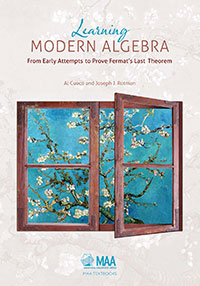Sol Lederman of Wild About Math interviewed Al Cuoco on his latest book Learning Modern Algebra: From Early Attempts to Prove Fermat's Last Theorem (co-author Joseph Rotman).
Listen to the interview here.
Learning Modern Algebra: From Early Attempts to Prove Fermat's Last Theorem
by Al Cuoco and Joseph Rotman
This
book is designed for prospective and practicing high school mathematics
teachers, but it can serve as a text for standard abstract algebra
courses as well. The presentation is organized historically: the
Babylonians introduced Pythagorean triples to teach the Pythagorean
theorem; these were classified by Diophantus, and eventually this led
Fermat to conjecture his Last Theorem. The text shows how much of modern
algebra arose in attempts to prove this; it also shows how other
important themes in algebra arose from questions related to teaching.
Indeed, modern algebra is a very useful tool for teachers, with deep
connections to the actual content of high school mathematics, as well as
to the mathematics teachers use in their profession that doesn't
necessarily "end up on the blackboard."
Showing posts with label Sol Lederman. Show all posts
Showing posts with label Sol Lederman. Show all posts
Friday, June 27, 2014
Friday, March 30, 2012
A Mathematician Comes of Age on Inspired by Math
MAA author Steven G. Krantz is interviewed by Sol Lederman on his podcast series "Inspired by Math".
Listen to the full interview.
Krantz is the author of A Mathematician Comes of Age. The book discusses the maturation process for a mathematics student. It describes and analyzes how a student develops from a neophyte who can manipulate simple arithmetic problems to a sophisticated thinker who can understand abstract concepts, can think rigorously, and can analyze and manipulate proofs. Most importantly, mature mathematics students can create proofs and know when the proofs that they have created are correct.
Listen to the full interview.
Krantz is the author of A Mathematician Comes of Age. The book discusses the maturation process for a mathematics student. It describes and analyzes how a student develops from a neophyte who can manipulate simple arithmetic problems to a sophisticated thinker who can understand abstract concepts, can think rigorously, and can analyze and manipulate proofs. Most importantly, mature mathematics students can create proofs and know when the proofs that they have created are correct.
Mathematics is distinct from other disciplines in the nature of its intellectual development. The book lays out these differences and discusses their significance.
Find this book in the MAA Bookstore!
Subscribe to:
Posts (Atom)


